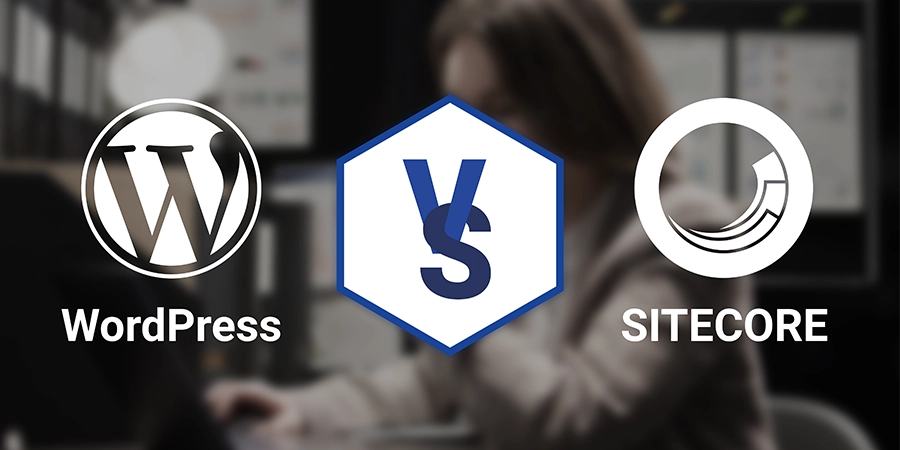Strategic Considerations for Choosing Between Sitecore and WordPress as Your CMS

Sitecore vs WordPress: Choosing the Right CMS for Your Needs
Choosing the right Content Management System (CMS) is essential for any successful website. It shapes how you manage and update your content, ensuring your site is scalable and adaptable. Among the many options available, Sitecore and WordPress are two leading CMS options.
This blog post will compare and contrast Sitecore and WordPress, helping you understand their key features and differences. Get the insights you need to make an informed decision on which CMS fits your requirements best.
Overview of Sitecore

Sitecore is a content management system that stands out in the digital experience platform arena, especially for enterprise-level businesses. Developed on the .NET framework, Sitecore is a fully integrated platform that offers extensive digital marketing tools and content management capabilities, tailored to businesses aiming for high-level digital transformations.

Enterprise Solution and Digital Marketing Integration
Sitecore is designed as a solution providing a powerful platform for businesses that require sophisticated content management systems. Sitecore's suite of tools enables enterprises to deliver personalized digital experiences at scale, reflecting the platform's emphasis on content personalization and marketing capabilities.
.png)
Customization and Scalability
One of the significant advantages of Sitecore is its deep customization capabilities. This proprietary CMS allows for solutions tailored to the specific needs of an organization, making it an ideal choice for those requiring a bespoke digital experience platform. Its architecture supports enterprise-level scalability, ensuring that even the most complex and high-traffic websites can perform optimally.

Marketing Automation and Integrated Tools
The platform offers comprehensive solutions for marketing automation, analytics, and personalized content delivery, enabling marketers to craft targeted campaigns and measure their effectiveness in real time.

Target Audience and Market Position
It caters to organizations looking for an integrated solution to manage complex web ecosystems, consolidate digital marketing efforts, and deliver personalized user experiences. Sitecore accounts for a significant portion of the market share among high-end, commercial software options for content management, appealing to sectors that demand a high degree of digital sophistication.

Core Functionality
Building on the .NET gives Sitecore a unique edge in terms of security, performance, and scalability. It offers a secure environment for managing content across various site locations, making it an ideal choice for businesses that prioritize data protection and site reliability. The .NET core also facilitates integration with other enterprise systems, enhancing operational efficiency and data coherence across digital platforms.

Enterprise-Level Businesses and Custom Solutions
Its ability to deliver custom solutions that align with specific business strategies makes it a go-to choice for companies aiming to leverage digital channels for growth and customer engagement.
Overview of WordPress

WordPress's journey from a simple blogging platform to becoming the cornerstone of web development proves its adaptability and user-centric design. As the most popular CMS platform globally, WordPress has democratized web development, making it accessible to a broad audience ranging from individuals and bloggers to small and medium-sized businesses.
This widespread appeal is largely due to its open-source nature, user-friendly interface, and the extensive ecosystem of themes and plugins it supports.

Simplicity & Accessibility
At its heart, WordPress is known for being user-friendly. It’s designed so that anyone, regardless of their tech skills, can create and manage a website efficiently. This accessibility is a big reason for its popularity.

Extensibility with Plugins and Themes
WordPress allows extensive customization through its vast library of over 58,000 plugins and countless themes. This means you can add just about any feature to your site and tailor its look to match your vision without needing to code.

Community Support
A massive, active community backs WordPress. This includes developers, content creators, and everyday users, all contributing to an ever-growing pool of knowledge, support, and innovation.

Versatility
WordPress’s flexibility makes it a go-to for various websites, from personal blogs to SMB websites, and even e-commerce platforms, thanks to its adaptability and extensive feature set through plugins.

Broad Appeal
Its broad appeal lies in its capability to cater to different needs, making it a top choice for individuals, bloggers, and small to medium-sized businesses looking for a reliable, scalable, and cost-effective web solution.
In essence, WordPress stands out for its ease of use, the vast array of customization options, and strong community support, making it a versatile and widely preferred CMS across different user segments.
Key Differences Between Sitecore and WordPress
User Interface


Sitecore presents an enterprise-level platform with a sophisticated user interface. Its advanced capabilities and customization options come with a learning curve, primarily suited for users with a technical background or organizations that can invest in training and certifications sitecore.

WordPress is celebrated for its ease of use, making it a popular CMS platform among a broad audience. Its intuitive dashboard and user-friendly interface ensure a gentle learning curve, appealing to wordpress users from bloggers to medium-sized businesses.
Customization Capabilities


Sitecore offers deep customization capabilities, leveraging the .NET framework for designing custom solutions. This makes it a powerful option for enterprise-level businesses requiring tailored digital experiences.

WordPress, facilitated by WP Engine, is known for its vast plugin ecosystem and themes. It provides significant flexibility and ease in customization. This makes wordpress sites adaptable to a wide variety of needs.
Performance and Scalability


Sitecore excels at managing high volumes of traffic and complex data, essential for enterprise-level platforms. Its scalability and performance capabilities are critical for large organizations that prioritize efficiency and reliability.

WordPress also offers scalability and can effectively manage high traffic levels with the right hosting solutions and optimization plugins, making it suitable for wordpress sites ranging from small blogs to larger business portals.
Security


Sitecore leads in security among cms platforms, offering a secure environment tailored for enterprise solutions. Its comprehensive security features address the needs of large organizations looking for reliability and protection.

While secure, WordPress requires diligence in managing third-party plugins to maintain wordpress security. Wordpress sites can enhance their security posture, illustrating a key consideration in the wordpress vs sitecore debate, especially for sites handling sensitive information.
Pricing Model


Sitecore reflects its enterprise-grade capabilities in its pricing model, with significant licensing and maintenance costs associated with this solution. Its investment level aligns with the expectations of businesses looking for a comprehensive CMS platform.

WordPress, often seen as a more basic cms platform, offers a cost-effective alternative for providing scalable solutions. This price accessibility makes it a favored option for a broad audience, adding depth to the wordpress vs sitecore comparison.
Support and Community


Sitecore offers professional support and resources, including training and certifications, for users navigating this enterprise solution within the CMS platforms landscape. The Sitecore community supports the platform's complex capabilities.

WordPress benefits from a vast support community, including forums, tutorials, and guides. The large developer ecosystem makes it easier for wordpress users to find help and resources for developing and maintaining their sites.
Pros and Cons
The table below details the target audience, pros, and cons of both Sitecore and WordPress, helping you assess which CMS better aligns with the specific needs, technical resources, and budget constraints of your organization or projects.
| Feature | Sitecore CMS | WordPress |
|
Target Audience |
Enterprise-level businesses needing integrated content management and digital marketing. |
A broad range of users, including individuals, bloggers, and small to medium-sized businesses. |
|
Pros |
Comprehensive enterprise solution. |
User-friendly interface, accessible to all skill levels. |
|
|
High customization capabilities for custom solutions. |
Extensive plugin ecosystem for easy functionality extension. |
|
|
Advanced marketing tools for effective customer engagement. |
Large community support with abundant resources. |
|
Cons |
Higher cost associated with licensing and maintenance. |
Potential security vulnerabilities requiring constant vigilance. |
|
|
Requires significant technical resources and expertise. |
Performance can vary based on plugin quality and hosting. |
|
|
Steep learning curve, less accessible for quick deployment. |
Dependence on third-party plugins for advanced features, which can complicate maintenance. |
Conclusion
We've detailed the strengths and applications of Sitecore CMS and WordPress, two of the most popular CMS platforms. Sitecore, tailored for enterprise sites, is equipped to handle complex needs in content management and digital marketing. With its considerable technical resources Sitecore is best suited for organizations looking for a custom solution that can fully integrate with their digital strategy.
On the other hand, WordPress powers a vast array of websites and is celebrated for its user-friendliness and flexibility. WordPress’s extensive plugin ecosystem allows users to enhance and tailor their sites without the deep technical investment that Sitecore requires.
When deciding between Sitecore and WordPress, consider the specific demands of your project, the available budget, and your technical capacity. Reflect on your long-term objectives and evaluate how each platform can support these goals.
With these insights, you're ready to select the CMS that will best propel your online success.


